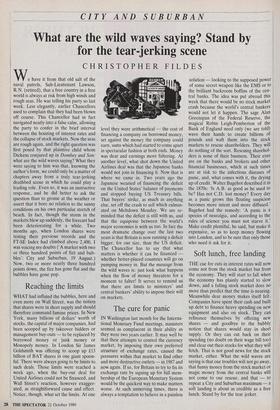Reaching the limits
WHAT had inflated the bubbles, here and even more on Wall Street, was the notion that shares were in short supply and should therefore command famine prices. In New York, many billions of dollars' worth of stocks, the capital of major companies, had been scooped up by takeover bidders or management buy-outs — to be replaced by borrowed money or junk money or Monopoly money. In London Sir James Goldsmith was offering to scoop up £13 billion of BAT shares in one giant spoon- ful. There were always going to be limits to such deals. Those limits were reached a week ago, when the buy-out deal for United Airlines could not be financed, and Wall Street's reaction, however exagger- ated, as straightforward cause and effect. Notice, though, what set the limits. At one level they were arithmetical — the cost of financing a company on borrowed money, set against the money the company could earn, sums which had started to come apart in spectacular fashion at both ends. Money was dear and earnings more faltering. At another level, what shot down the United Airlines deal was that the Japanese banks would not join in financing it. Now that is where we came in. Two years ago the Japanese wearied of financing the deficit on the United States' balance of payments and stopped buying US Treasury bills. That buyers' strike, as much as anything else, set off the crash to sell which culmin- ated on Meltdown Monday. We are re- minded that the deficit is still with us, and that the equipoise between the world's major economies is with us too. In fact the most dramatic change over the last two years is that Britain is now running a deficit bigger, for our size, than the US deficit. The Chancellor has to say that what matters is whether it can be financed whether better-placed countries will go on pumping money in. But the message from the wild waves is: just look what happens when the flow of money threatens for a moment to falter! It serves to remind us that there are limits to ministers' and central bankers' ability to impose their will on markets.


























































 Previous page
Previous page